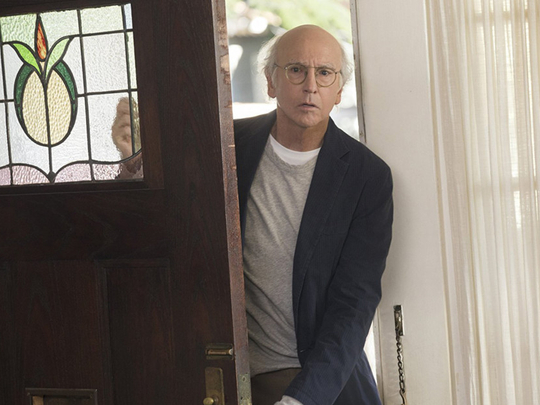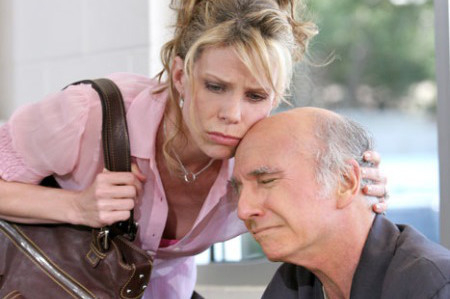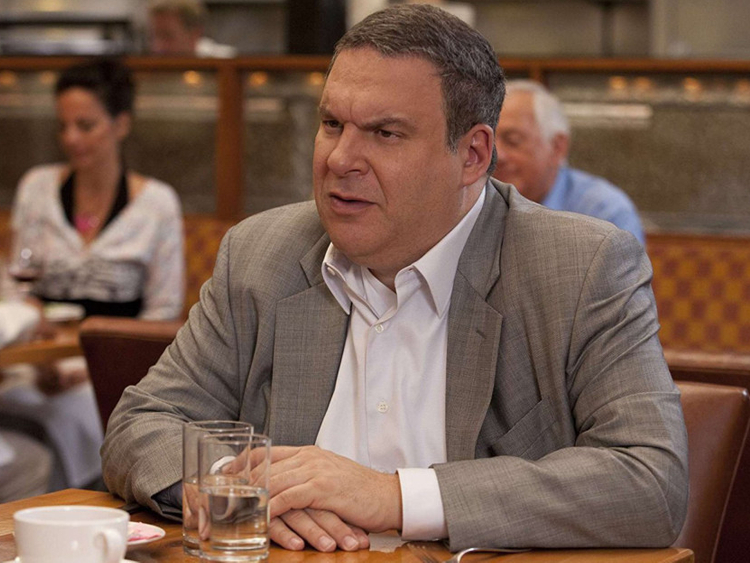
Television these days is like a big-name music festival — if you want to put your sufficiently famous band back together, someone will write you a check and send a car. But there was never any question that Larry David’s series Curb Your Enthusiasm would be welcome any time on HBO, where its long-delayed ninth season began last Sunday. Indeed, the question after each season of Curb was whether David was interested in doing more, not whether the network would want him to.
There was a gap year between seasons three and four, seasons five and six and seasons seven and eight. If the wait for season nine was a little longer — has it been six years since the series left us to our own devices? — it picks up with no alterations other than those time arranges; otherwise, it is completely of a piece with the seasons that preceded it. There has been no attempt to fix what was not broken, to innovate, to go deeper; given that one point of the show is the impossibility of meaningful change, change would be inappropriate.
All the old music, composed and improvised, is there, expertly played. Here is Larry back again, with his unusually loud way of talking, and his trademark noises — the long “eeeeeeeeeeh” he’ll insert to delay an admission, or the quick “nah” with which he’ll refuse a request or an invitation.
Though Larry’s narcissism might be said to have a certain contemporary resonance, there has been no move to bring the show explicitly into 2017, whatever that would mean, and comment on the world we find ourselves mired in. Indeed, the signal political event referenced in the season nine opener is the 1998 death sentence placed upon Salman Rushdie by Iran’s Ayatollah Ruhollah Khomeini, which Larry has spent five years turning into a musical.
“There’s a lot of funny stuff in there,” Larry tells his manager, Jeff (Jeff Garlin).
OLD HANDS RETURN
Curb Your Enthusiasm is an oddly traditional kind of comedy, something in the spirit of an old Laurel and Hardy or Harold Lloyd two-reeler film, with a modern neurotic sensibility overlaid. Like the classic comics of yore, Larry is a hero and a victim, the architect of his own downfall, sometimes deserved, sometimes not, but always the result of his being out of joint with a world whose injustices and inconsistencies other people are able to accept or ignore. Only Jeff and JB Smoove as Leon, Larry’s housemate, see his point. Susie Essman, as Jeff’s wife Susie, is back to disagree.
The season premiere also featured appearances by old hands Cheryl Hines as Larry’s ex-wife and Ted Danson as a version of Ted Danson. Carrie Brownstein guested as Larry’s assistant Mara, a character straight out of Portlandia, returning to work after what Larry calls a “two-day unauthorised vacation”
“It wasn’t a vacation,” Mara replies. “I was very constipated.”
“Half the population is constipated,” Larry points out. “I got married constipated.”
This subject is batted around for a not surprising long while. We will also be introduced, over the course of a slightly expanded half-hour, into the matter of “the foist”; Richard Lewis and his dead parakeet; the question of whether a man with little hair should pay more for a haircut than a man with lots; and when and for whom one holds open a door. Most of the impressive amount of trouble Larry causes he brushes off like lint; but at the end he is in disguise, crawling through a restaurant on his hands and knees.
Like Seinfeld, the show David co-created with Jerry Seinfeld, Curb Your Enthusiasm is about the way little things prey on the mind and influence decisions that lead to big, usually unfortunate ends. It is about the lies that come back to haunt us, and the truths that come back to haunt us too. Much of what he says makes sense; the comic in him compulsively holds the world up to ridicule, but irreverence also comes with a price.
Larry is a fortunate person who cannot stop doing the sometimes literal math that will prove he is not one. (“This is not the middle,” he tells Richard Lewis. “I took more steps than you to get here.”) He assumes an intimacy with practical strangers he thinks allows him to say whatever is on his mind. “How is it appropriate for you to have an opinion about this?” he’s asked at one point, having inserted himself into an argument that, in typical Curb style, his own earlier remarks have caused.
“I saw wrong and tried to right it,” he replies.
“Strangest man on the planet,” Danson says of Larry in the episode. But we are all a little bit Larry; we know what it is like to be misunderstood or mistaken, to take the pre-emptive step that leads to the very outcome we were trying to avoid.
“I was trying not to offend you and yet I wound up offending you, which is quite ironic,” Larry says to one of Sunday’s several offended parties, efficiently stating a theme.














